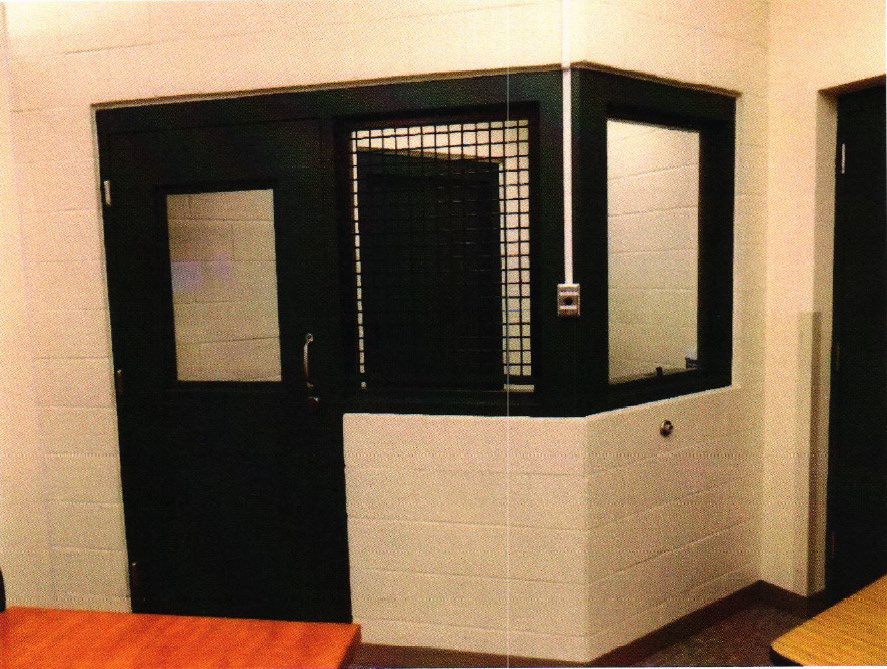
Author: Nina Arranza-Riley
WA Supreme Court: Forcing defendants to appear for hearings from in-court holding cells is unconstitutional
June 26, 2024 – In a unanimous decision, the Washington State Supreme Court ruled in the Luthi case that the Cowlitz County Superior Court’s practice of confining defendants to an ‘in-court holding cell’, without any sort of individualized inquiry, is unconstitutional.
The Luthi case centers around Cowlitz County Superior Court where it is common practice to use a courtroom in the Cowlitz County Jail for short criminal proceedings. Within this courtroom is a small in-court holding cell where defendants such as Cassandra Luthi are kept during such proceedings. The cell is about 5 feet wide, five feet deep and eight feet long, with a mesh window that allowed defendants to speak with their attorneys. A jail guard would be inside the holding cell with the defendant.

Cowlitz County Superior Court often utilizes a courtroom within the Cowlitz County Jail for short criminal proceedings where no jury or witnesses are present. They required criminal defendants to appear for their hearings within this holding cell. The WA Supreme Court has ruled this as unconstitutional because it undermines the presumption of innocence.
In 2021, Luthi pleaded guilty to delivery of heroin within a school zone and was given 36 months of community custody as a mental health sentencing alternative (MHSA). She was taken into custody at Cowlitz County Jail on December 20, 2022 where she was held without bail until her MHSA revocation in February 2023, which took place in the jail’s courtroom. Her defense attorney, who was familiar with the in-court holding cell, filed a motion for Luthi “to appear in court without restraints.” This was not ruled upon before her hearing, so Luthi again objected to the use of the cell, which was orally denied by the judge who opined that the cell was not “at the same level as shackling” and did not “really see any prejudice to Ms. Luthi.”
The Washington State Supreme Court disagreed, reversing and remanding for a new MHSA revocation hearing. “The in-court holding cell undermines the presumption of innocence, interferes with a defendant’s ability to communicate with counsel, and violates the dignity of the defendant and the judicial proceedings,” Justice Mary Yu wrote in the opinion.
For more information about this case, please read “Defendants can’t be forced to appear in court from jail cells, WA Supreme Court rules” by David Gutman of The Seattle Times.
Pierce County burglary conviction reversed due to insufficient evidence
May 17, 2024 – Marshall L. Middlestaedt spent 1 year in prison before being released from custody following the reversal of a second-degree burglary conviction in Pierce County. Middlestaedt was represented by Washington Appellate Project attorney, Matthew Catallo.
In April 2022, Middlestaedt was arrested for second-degree burglary after property owners called the police to report what appeared to be intruders cutting the chain to one of their padlocked gates. At jury trial, witnesses including one of the property owners and one police officer testified that the property could be entered by simply walking through the gaps next to another gate on the property, without needing to open the gate itself. Despite the chain being cut, nothing was taken from the property and no one entered the house on the property. Though Middlestaedt’s defense attorney from the Department of Assigned Counsel suggested for jurors to hear instruction for a lesser offense of trespassing, the court declined and the jury found Middlestaedt guilty of burglary.
Catallo argued on appeal that because the property was not entirely enclosed, only partially fenced, by law the property did not count as a building so Middlestaedt could not have committed a burglary. Pierce County agreed and conceded that the Court of Appeals should reverse and dismiss the burglary conviction. The Court in their May 7, 2024 opinion accepted the State’s concession, reversed the conviction and dismissed the case with prejudice.
When asked how his client responded to the news, Catallo said “elated, and he was very eager to leave when he realized that he was essentially held on an invalid conviction.”
Middlestaedt’s case demonstrates the importance of the appeals process in uncovering errors, even non-malicious mistakes, that lead to wrongful convictions, and remedying them as quickly as possible. “I, frankly, just think no one realized that this was a big issue,” Catallo said. ” It just seems like a mistake. That’s why the process is important. I’m not saying it’s a mistake that can be made lightly, of course, but the process is important so we can uncover errors like this and rectify them.”
For more information about this case, please read “Technicality? Pierce County man’s burglary conviction tossed for insufficient evidence” written by Peter Talbot of The News Tribune.
In the Court of Paw: Do dogs belong in the courthouse?
May 18, 2024 – Prosecutors, police and victim advocates generally support the use of courthouse facility dogs in assisting victims and witnesses during court testimony, but what about the accused? The presence of a dog creates undue sympathy for witnesses and prejudice towards defendants.

Man’s best friend is finding employment opportunities within the justice system, with more and more pooches across the country obtaining the job title of “courthouse facility dog,” a dog that is trained to participate in legal proceedings. According to the Courthouse Dogs Foundation, as of April 12, 2024, there are 22 courthouse facility dogs in Washington State and 322 courthouse facility dogs (and growing) across the U.S. overall.
Advocates for the use of courthouse facility dogs cite that the dogs’ presence assists with comforting anxious and traumatized witnesses in criminal trials. While admirable, their presence may be going further than legislation intended – some dogs are even dressed up before trial and have their own dedicated social media accounts. Defense lawyers are rightfully concerned about what that means for the fair representation of their clients, who are seldom provided the same compassionate comforts and positive publicity.
“A dog signals to a jury that an alleged victim is sympathetic, needy or vulnerable,” stated Washington Appellate Project attorney Jan Trasen in an article interview with the Wall Street Journal (WSJ). “The accused person doesn’t get to sit there with props.”
There are no shortage of dog lovers in the offices of the Washington Appellate Project. The office refrigerator shows as much, with numerous pictures of staff’s pets covering the front. Dogs are loved and precious creatures, but perhaps do not belong in an environment where the goal is fair and equitable justice.
“I love dogs,” added Trasen, whose very own canine companion, Bear, was trained at a juvenile detention center before joining Trasen’s family. “I just don’t think they belong in courtrooms.”
Read more on the issue: The Bone of Contention – WSJ Article
Client at the center of Supreme Court’s Blake decision has passed away
October 6, 2023 – Washington Appellate Project grieves the loss of Shannon Bowman, also known as Shannon Blake, who passed away unexpectedly on August 14, 2023. Bowman, represented by Washington Appellate Project attorney Richard Lechich, was at the heart of the famous Supreme Court case, State v. Blake, that struck down Washington’s unconstitutional drug possession law.
Bowman’s obituary describes her as a “child-at-heart who marched to the beat of her own drum.”
The Blake decision was monumental in changing lives for the better, overnight impacting those who were previously charged and convicted under the unlawful drug possession statute. “Shannon’s case has given many people hope and a second chance, and many of my other clients are thankful for that,” Lechich said in an interview. “I’m proud and grateful that I was able to represent her in the Washington Supreme Court.”
We are deeply saddened by Bowman’s passing, and are grateful that Bowman sought to appeal and that her appeal connected her with our organization. This article from The Olympian further highlights the impact of Bowman’s case and how she was able to change the lives of those around her.


